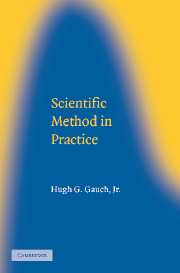Book contents
10 - SCIENCE'S POWERS AND LIMITS
Published online by Cambridge University Press: 05 March 2015
Summary
What are science's powers and limits? That is, where is the boundary between what science is and is not able to discover? The American Association for the Advancement of Science has identified that issue as a critical component of science literacy: “Being liberally educated requires an awareness not only of the power of scientific knowledge but also of its limitations,” and learning science's limits “should be a goal in all science courses” (AAAS 1990:20–21; also see p. xv). As Caldin (1949:vii) warned, “The prestige of science to-day is very great; scientists have therefore a certain responsibility to consider carefully the scope and limitations of their professional activities.”
This question about science's reach has elicited great interest. For instance, Horgan (1996) interviewed dozens of leading scientists regarding the limits of scientific knowledge, and his book became a runaway best-seller and made the front page of the New York Times book-review section (30 June 1996). Likewise, the end-of-the-millennium special issue of Scientific American offered fascinating reading on “What Science Will Know in 2050” (December 1999).
People's motivations for exploring the limits of science can easily be misconstrued, so they should be made abundantly clear from the outset. Unfortunately, for some authors writing about science's limits, the motivation has been to exaggerate the limitations in order to cut science down, support anti-scientific sentiments, or make more room for philosophy or religion.
- Type
- Chapter
- Information
- Scientific Method in Practice , pp. 367 - 376Publisher: Cambridge University PressPrint publication year: 2002



